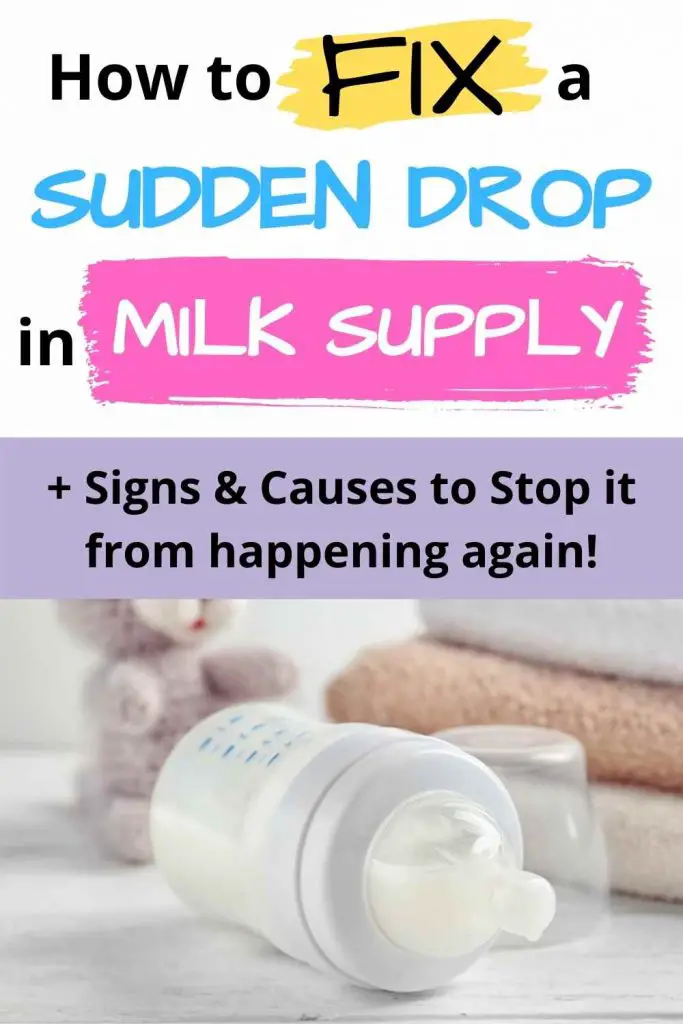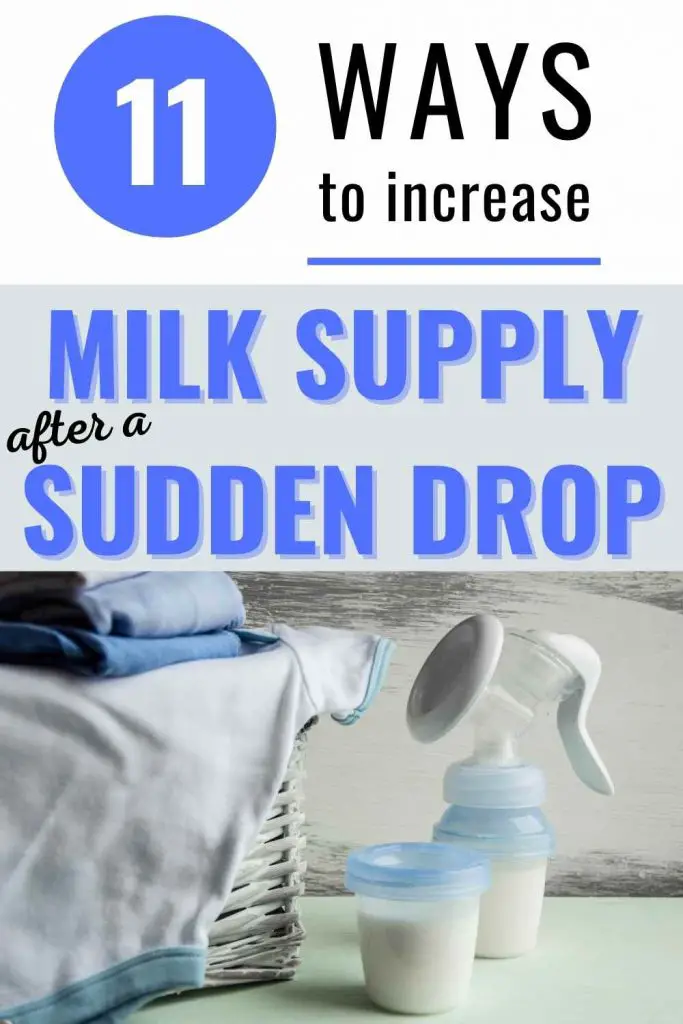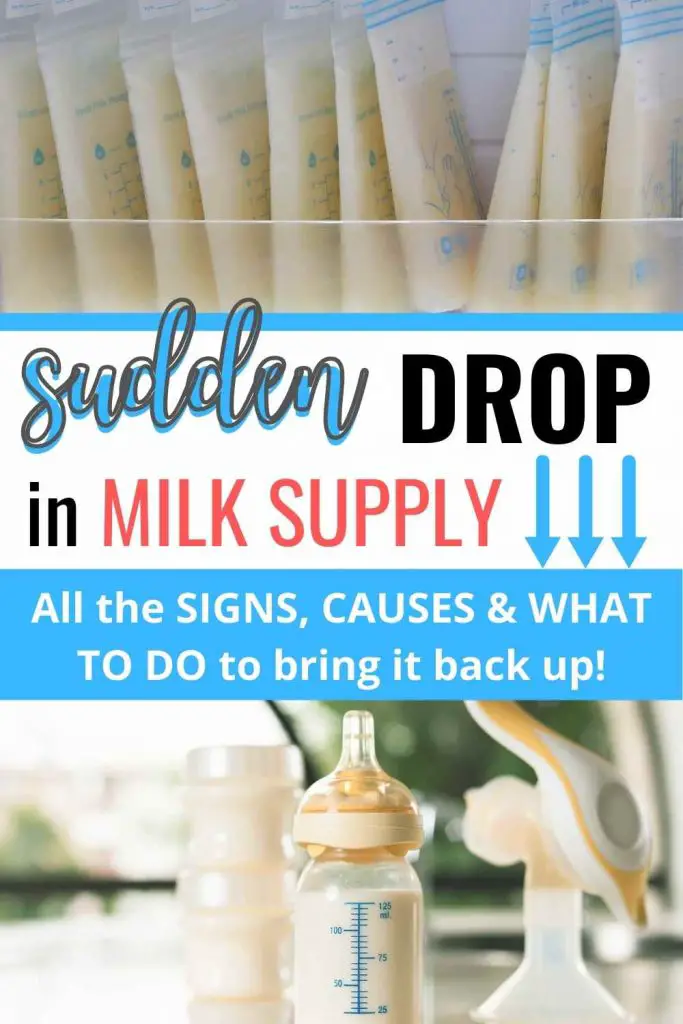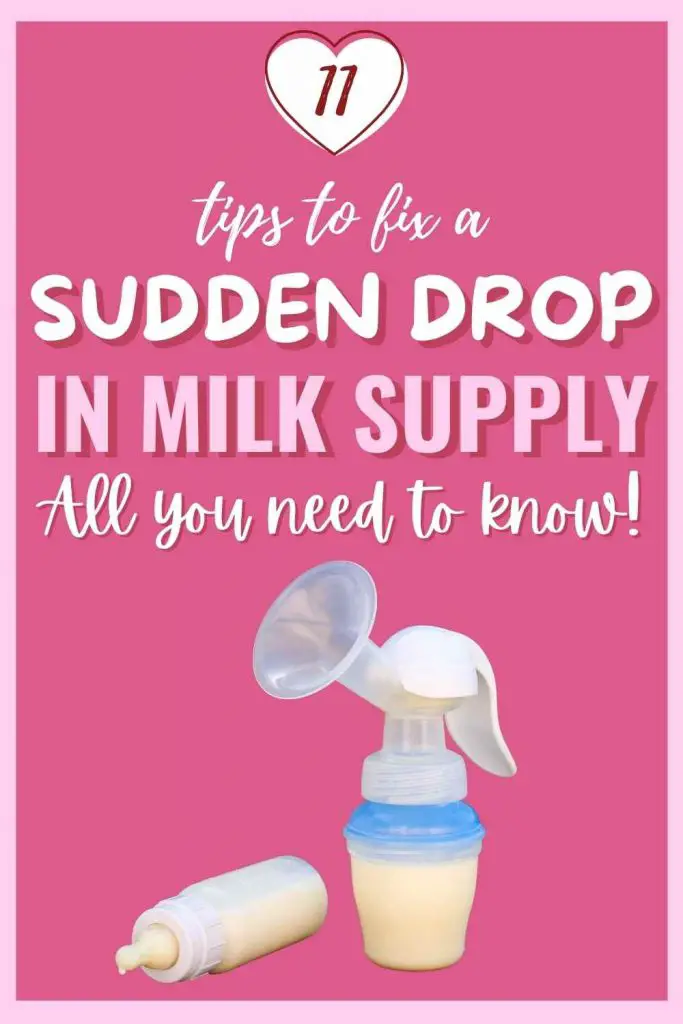Are you a breastfeeding mom who’s experiencing a sudden drop in milk supply and you are looking for some answers as to why it’s happening and how to fix it? Don’t panic mama, you’ve come to the right place 🙂
Let me start by saying: I feel you! I have been breastfeeding my second daughter for more than a year now and I have experienced a sudden decrease in breast milk supply at least twice: at 4 and 6 months. And it was so stressful! Particularly because breastfeeding has always been my best way to soothe my crying baby.
My baby was constantly upset because she wasn’t getting enough milk to fill her up, and I was upset because I couldn’t give her enough of that one thing that always calms her.
The first time it happened I honestly hit panic mode. I was so scared I was never going to produce enough breast milk for my baby again. The second time I sort of knew what to do, so I was able to act quickly and stay more calm.
Whether you are breastfeeding exclusively of pumping as well, know that a sudden drop in milk production is quite common amongst breastfeeding moms and there is no need to panic. You got this!
In this article I will go through all the signs that your milk supply dropped suddenly (because it’s not always easy to know if it’s happening), the possible reasons behind it happening, and what you can good to get your normal supply back.
Related: 18 Tips on How to Soothe a Crying Baby
Related: Healthy snacks for breastfeeding
Related: Lactation supplements

Signs of Low Milk Supply
It’s not always easy to understand if your milk supply is dropping, particularly if you are breastfeeding elusively. It might be a bit easier if you are also pumping, as you can measure the amount of milk you produce.
Below are all the possible signs that your milk supply is decreasing:
- Baby isn’t gaining enough weight
- Baby doesn’t have enough solid or wet diapers
- Empty/deflated breast(s)
- Baby wanting more feedings, either during the day or night
- Baby having shorter and fussy feeds, when they seem dissatisfied
- Pumping less after a feeding
- Fussy baby in the evening (such as the witching hour)
- No feeling of a let down
However, note that most of these are actually perfectly normal when breastfeeding, and don’t necessarily mean that you are experiencing a drop in milk supply.
There are lots of reasons why your baby may be wanting to feed more often, such as for comfort if they are not feeling well or teething, or if they are going through growth spurts. When that happens, it may take a little while for your body to adjust to the change and start producing more milk to meet baby’s needs. But it doesn’t mean you are producing less of all a sudden! Instead, it means your baby temporarily needs more and your body needs to start producing more.
If that it the case, just be a little bit patient and wait until your baby feels better or stops going through the growth spurts. It may take a few days, but you will also start noticing that your body starts producing more milk in the meantime.
What you are likely going to experience is very big breasts full of milk once baby goes back to feeding at their normal rate! When that happens, your baby will not empty both breasts because you are over-producing milk, and it will take a few days for your body to start producing less again. I remember I had huge breasts for at least a couple of days! The joys of breastfeeding …. I know! 🙂
The only two signs that tell you with certainty that you are not producing enough milk are the first two:
- Baby isn’t gaining enough weight
- Baby doesn’t have enough solid or wet diapers
While it’s normal for a newborn to loose some weight soon after birth as you are waiting for your body to start producing milk, weight loss is not normal once they are older. If you are keeping track of your baby’s weight at home and you notice a drop, make sure to get in touch with a pediatrician to find out the reason behind it.
Causes for Low Milk Supply
Once you’ve made sure that you are indeed experiencing a sudden milk supply drop, it’d be good if you could find the cause of it, so that you can rectify the problem. A list of all the causes of a sudden dip in breast milk supply can be found below here.
Most of the time, the reason behind you producing less milk is very easy and straightforwards to identify. However, if none of the reasons listed below resonate with you, you might want to get help from a certified lactation consultant and get to the bottom of it.
1) SKIPPING FEEDS
The body is an amazing machine and it has a clever way of knowing how much milk to produce for your baby: when baby feeds from the breast, a signal is sent to the brain that more milk needs to be produced, and the more baby feeds, the more milk the body generates.
Now, if you skip some feeds (one feed is okay, multiple feeds will become a problem), the body receives the signal that less milk is needed and will automatically start producing less.
This applies whether you are missing a breastfeeding or a pumping session. So, make sure not to skip any! And if you are giving a bottle to your baby instead of breastfeeding at certain times of the day, make sure to have a pumping session at the same time.
Not to mention that if you skip a breastfeeding session, particularly in the first few weeks after birth, you are at high risk of having a blocked milk duct and potentially mastitis.
My second daughter was a few weeks old and we were out at a Christmas parade when she started showing signs of hunger. But the wind was blowing and it was so cold: I didn’t feel like feeding her in the open air. So, I decided to walk all the way to the car and feed her there: she was screaming at the tops of her lungs, poor thing. The walking soon turned into running.
By the time I got to the car and fed her, one of my breasts was so huge and hard! That’s when I learnt that skipping or delaying feeding can cause plugged milk ducts, which can subsequently lead to mastitis. I was lucky enough to avoid mastitis, but it took me quite a few days of massaging a very sore breast to get the plugged duct to drain completely.
Note: if you are skipping feeds because you are trying to stop breastfeeding your baby at night, then make sure not to drop all feeds at once. You can find a whole lot of information on how to wean your baby from breastfeeding at night here.
Related: How to Stop Breastfeeding a 1 Year Old at Night

2) NOT NURSING ON DEMAND
This is also closely related to skipping feeds. It is very important to feed on demand, particularly during the first few weeks of baby’s life, instead of sticking to a strict schedule. This way your body can establish a good milk supply depending on your baby’s needs.
Also, babies go through various growth spurts during witch they feed way more often. They usually have an initial spurt between 1 and 3 weeks and another between 6 and 8 weeks. After that, you can expect more at 3 months, 6 months and 9 months. So, if you are experiencing a sudden decrease in milk supply at 6 months, this might be why.
During these cluster feeds, your body starts producing more milk to meet baby’s needs. While your baby may be fussy for a couple of days while the milk supply increases, it should all get back to normal soon.
If you don’t feed on demand during these growth spurts, thinking that’s more important to stick to a schedule for your baby’s routine, your milk supply won’t increase and your baby will be fussy for a looooong time. This can be perceived as a drop in your milk supply, when in reality your body is still producing the same amount of milk: just not enough for your baby anymore!
3) INTRODUCING FORMULA
Introducing your baby to formula could be another cause of your breasts producing less milk. This happens because giving your baby formula instead of breastfeeding equates to skipping a feed, with the same consequences described above. The baby is not stimulating the breast, therefore the body is not producing more milk and you will experience a drop in milk supply.
If you are thinking of supplementing breastmilk with formula because you are worried you are not producing enough milk, you need to understand that this will actually have a negative effect on your milk production. Unless you are pumping at the same time that your baby is having a bottle, you are actually stimulating the breasts even less, and your milk supply will keep going down.
The first few days after labor and delivery can actually be full or worry and anxiety about your milk not coming. I remember I was freaking out because it felt like my milk was never going to come – it took my body 5 days to start producing it! During this time, I learnt it’s very important not to feed formula to your baby, as he/she needs to keep sucking from your breasts for your body to start producing milk!
Related: 25 Formula Feeding Tips to Make Bottle Feeding a Breeze
4) BABY STARTING ON SOLIDS
When your baby starts on solids, he/she will naturally start breast or bottle feeding less (you might even have a baby refusing the bottle), and your milk will supply will decrease. If you are breastfeeding, you might not even notice it (I didn’t). However, if you are pumping you will notice that the amount of milk you can collect is going down.
According to Kellymom, if baby started solids early (before around 6 months) or is eating lots of solids early on, you are more likely to notice a drop in supply. A very gradual start to solids around 6 months or later is less likely to affect milk supply.
If this is the cause of your drop in milk supply, there’s nothing to worry about! This is a normal part of the breastfeeding journey. It just means your baby is growing up 🙂
Related: Baby Suddenly Refusing Bottle (Why & 19 Things to Try!)
5) BOTTLE FEEDING THE TRADITIONAL WAY
If you are experiencing a sudden drop in milk supply when exclusively pumping and you are bottle feeding your baby the traditional way (baby lying down horizontally and vertical bottle pouring milk into their mouth), there’s a very high chance that your baby is gulping milk down too quickly.
When this happens, your baby’s brain doesn’t get the signal that they are full in time, and your baby will still be hungry at the end of the bottle. As a result, they might want to feed more than what they actually need, and you will be left with the impression that you are not producing enough milk.
If that is the case, I highly recommend you give paced bottle feeding a try! This is a method of bottle feeding that mimics breastfeeding, holding the baby upright and the bottle horizontal. It has many benefits for the baby and it’s also perfect if you are formula feeding. We used paced bottle feeding with our first daughter who was formula fed and it was a game changer.

6) LACK OF SLEEP / STRESS
When stressed and very tired, rising levels of certain hormones such as cortisol can dramatically reduce your milk supply. According to Shivan Patel, M.D. Obstetrics and Gynecology, stress is the no. 1 killer of breastmilk supply, especially in the first few weeks after delivery.
It’s no secret that the first few weeks (who am I kidding … months and couple of years!) with a baby can be extremely challenging, particularly from a sleep perspective. You will be up all night to feed or sooth your baby to sleep and your chances to rest during the day are often slim. And if your milk supply drops, you might start stressing about that too, which ends up being a massive vicious cycle.
Be particularly vigilant around the 4 month or 6 month sleep regressions, as these could be giving you extra stress and be the root cause of a sudden drop in milk supply at 4 months or 6 months.
And really make sure to rest as much as you can. Ask your partner, any family member or friend to help out and look after bubs while you take a nap or have a nice bath. Even go for a walk or do whatever else helps you unwind and relax.
If you are really struggling with stress, anxiety and/or lack of sleep, make sure to reach out to someone: whether that be a family member, a fried or a medical professional. And remember that what you are feeling is totally normal, you are not failing anybody and you are still an amazing mom!
7) DIET
7.1) NOT EATING ENOUGH
Are you eating enough mama? Producing breastmilk requires a lot of energy and burns a lot of calories! If you are not feeding enough, your milk supply might drop as a consequence.
My daughter is 13 months, I am still breastfeeding, and I am still eating like I never did in my life before! I am constantly hungry, honestly. When people see how much I eat, they look at me like I am crazy … their face when I say “I am still breastfeeding – need to eat!” is always priceless.
Some sources discourage breastfeeding moms from being on a vegan or keto diet. However, there are successful stories, such as this one, from moms breastfeeding while on these diets. I personally think that if your body is used to it, then you are on a good track. But if you’ve never done it before, don’t start it while breastfeeding: your body might need time to get used to it!
7.2) HERBS THAT AFFECT MILK SUPPLY
Also be careful of some herbs that affect milk supply in a negative way. Herbs like mint, oregano, sage, thyme and parsley are all said to reduce milk production, and are amongst other foods that should be avoided while breastfeeding.
I honestly eat a lot of all of the herbs listed above (I am Italian, we put herbs everywhere), but never felt like they have been affecting my milk supply. That said, if you are experiencing a drop, it might be worthwhile revisiting your diet too.
7.3) FENUGREEK
While fenugreek is an herb that is known for increasing your milk supply, be careful that it can also have the opposite effect! This is especially true for women that have a thyroid problem.
According to this article from Breastfeeding with love, fenugreek can make hypothyroidism worse and reduce milk production. Furthermore, it reduces blood glucose levels, which can be a problem for women with diabetes or hypoglycemia.
8) NOT DRINKING ENOUGH / DRINKING TOO MUCH
Did you know that breastmilk is made of 90% water?? For this reason, it’s very important to stay hydrated and drink lots of water. Be particularly careful if you are at the beach with baby and the weather it’s very hot!
Even though some experts recommend drinking about 128 ounces per day, I don’t think you need to get too fixated with a specific quantity. Just make sure you drink enough to satisfy your thirst.
I have often found myself so busy doing things around the house and so exhausted with a baby, that I was actually too tired to even pour a glass of water for myself. Some moms might even get busy when they get back to work and forget to drink enough fluids. Make sure not to make that mistake! 🙂
Fluids can come from different sources other than water: make sure to also eat lots of vegetables, drink some milk or have some soup if it’s cold outside.
But … also make sure not to drink too much! It’s a balancing act … experts say that drinking too much water and forcing fluids has been shown to diminish milk production. Again, drink enough to satisfy your first, and maybe a little bit more – but don’t overdo it.

9) TOO MUCH CAFFEINE
Caffeinated soda, coffee, tea, and chocolate are okay in moderation. However, large amounts of caffeine can dehydrate your body and lower your breast milk production.
I know that you’ve probably been craving your coffee for 9 months while pregnant and you can’t wait to start again. Plus, all the sleepless nights definitely don’t help! But don’t drink too much of it. About 2–3 cups (470–710 ml) of coffee or 3–4 cups (710–946 ml) of tea per day is generally considered safe.
Not too mention that too much caffeine can also affect your baby via the breastmilk, causing irritability and sleep problems. Watch out!
10) GETTING YOUR PERIOD
I was so lucky not to get my period back until I was about 8 months (I hate having my period!), but once I got it back, I did notice a little drop in milk supply.
Apparently, it’s normal for menstruation or ovulation to result in a temporary drop in milk supply. You might also notice cyclical dips in milk supply before your period returns, as your body gets ready to be fertile again.
11) GETTING PREGNANT
Congratulations mama! Another baby, how exciting! But be prepared that getting pregnant while still breastfeeding can also cause a milk supply drop. This usually happens by mid-pregnancy, but can also happen as early as the first month.
This drop in milk supply is due to all the hormonal changes that are going through your body. Don’t despair though, it shouldn’t last too long.
As a side note, getting pregnant can also affect the composition of your milk, as your body starts producing more colostrum. This will affect the milk taste: some toddlers have been reported not to like the taste change and may wean as a result.
12) WRONG SIZE FLANGES / NOT PUMPING PROPERLY
If you are pumping, be aware that an old pump (older than a year) or an incorrect flange size might not be very efficient at emptying the breasts. This will send the brain a signal to produce less milk and will therefore cause a drop in milk supply.
Even if you’re a pro and have been pumping for a while, keep in mind that your flange sizing can change during your breastfeeding journey, and you may need to buy a new one after a while. You might even find that each breast needs a different size. You can read this Medela article for more information on flange sizes.
Remember that pumping shouldn’t hurt! I pumped for a little while with my second daughter: it was so bloody uncomfortable and I was getting very little milk out. It took me a while to realize that I was totally using a wrong size flange.
Related: 25 Formula Feeding Tips to Make Bottle Feeding a Breeze

13) TOO MUCH EXERCISE
Exercise postpartum can be great for a new mom. It can help to lose some extra weight that you put on during pregnancy, or it can help with all the stress and anxiety. However, don’t push yourself to the limit just because you want to lose some weight!
Exercising too hard, particularly if you are not used to it, can easily lead to dehydration, which can lead to a decrease in your milk supply.
14) ILLNESS
Illness, especially if you have a fever, a stomach bug or mastitis, can result in a temporary decrease in milk supply. It’s not the illness itself that affects your milk supply (unless you have mastitis!), but the related symptoms. These usually are fatigue, diarrhea, vomiting or a decrease in appetite, which can all lead to dehydration.
Also, be careful with decongestants if you have a cold! While these are designed to dry up your sinuses, they can also dry up your milk supply.
15) BIRTH CONTROL
Have you started hormonal birth control recently? Hormonal birth control, particularly if containing estrogen, can significantly decrease your milk supply. So, when you tell your doctor that you’re breastfeeding, they’ll probably prescribe the mini-pill (containing progestin only), which shouldn’t affect your milk supply at all.
If you are looking at a more permanent solution to birth control, such as an IUD (i.e. Mirena), you might find some controversial information online. There are quite a few articles that report the Mirena as a reason for affecting the milk supply. However, recent studies have found that a hormonal intrauterine device (IUD) implanted immediately after birth does not negatively affect a woman’s ability to lactate and breastfeed.
I personally wouldn’t risk it if I could wait. But also understand that not all women have that luxury. My wife has endometriosis for example, and had a Mirena implant soon after giving birth to our first daughter.
Ways to Increase Milk Supply after a Sudden Drop
If you are experiencing a sudden decrease in milk supply and are worried that it’s not just your child going through a growth spurt, there are a few things that you can try to increase your milk supply again. I have listed them all here.
If, instead, you realize that your baby is just going through a growth spurt and needs to feed more than normal, then just be patient. It will take a couple of days for your body to start producing more milk and, most times, everything will go back to normal within 3-5 days.
If you are unsure or too worried about it, I would highly recommend you enroll in a breastfeeding course, or you talk to a Certified Lactation Consultant. I have compiled here a list of the best online breastfeeding courses (including FREE classes!).
1) FEED ON DEMAND
Like I mentioned above, skipping feeds or not feeding on demand can send your body the wrong signals that it’s producing more milk than what your baby actually needs, and it will start producing less.
Make sure that you feed on demand, when baby’s showing hunger cues. Early Hunger cues in newborns are:
- Fists moving to the mouth
- Head turning to look for the breast
- Becoming more alert and active
- Sucking on hands or lip smacking
- Opening and closing mouth
Later cues are fussing and crying, but you really want to avoid getting to that stage.

2) REST AS MUCH AS YOU CAN
“Sleep when baby sleeps” everyone says. “Easier said than done” you say. Yip, been there, done that. It’s not easy … but it’s also not impossible! Make it happen if you can!
Get your partner, other family members or friends to help out with baby or house chores. If a friend offers to cook a meal for you, don’t turn it down for pride. If you feel like your partner is not helping enough, send them a gently reminder that you need some extra support: they might not even realize that you need more help unless you tell them.
And if you can’t unwind enough to sleep, at least have a good rest. Give your baby to someone else just for a little while. Have a relaxing bath, go for a walk, or watch some mindless television.
3) FIND WAYS TO RELAX
If you are stressed or anxious about anything that’s happening in this new crazy journey called motherhood, make sure to find ways to relax. Everyone is different, and different things will work for different people.
I personally find a walk at the beach to be very relaxing for me, or a good session of yoga. Other people prefer meditation, running, listening to music while being mindless, writing, and so on. Find what works best for you.
If you feel like you are really struggling with all the feelings, then make sure to reach out for support. Talk to friends, family or a medical professional. It’s totally normal to feel the way you are feeling and no one will judge you.
PSI (Postpartum Support International) has a great list of support groups and contacts for mental health professional all over the world, including a helpline in case of emergency.
Related:
– Signs of Postpartum Anxiety and Tips on How to Deal with it
– What to REALLY expect with your Postpartum Recovery
4) TAKE SUPPLEMENTS
There are some lactation supplements that you can take to increase your milk supply. The supplements listed below are all natural and, even though there are only two herbal supplements that are considered to be safe by the FDA (fenugreek and fennel), many other herbs have proven to be effective in increasing the milk supply for breastfeeding women. Just make sure to use them with caution and, if you experience any side effect, stop immediately.
Supplements that increase milk supply:
- Fenugreek: this herb is very well known for being effective in increasing the amount of milk that your body produces. However, remember that in some women it can have the opposite effect.
- Blessed Thistle is also a plant that is thought to increase milk supply when ingested.
- Let There Be Milk! is another a good alternative. It’s a concentrated blend of different herbs: blessed thistle, red raspberry leaf, fenugreek, goats rue, and marshmallow root. You can buy it in either capsules or liquid.
- Mommy Knows Best Fenugreek-Free: this is a great option if you are looking for something without fenugreek. It contains a mixture of blessed thistle, milk thistle, goat’s rue, and marshmallow root.
Other natural supplements that you can look into:
5) ADJUST YOUR DIET
These foods are also said to increase breastmilk production: oatmeal, carrots, fennel, nuts (almonds in particular), chickpeas, ginger, dark leafy greens and dates. You could try eat some of these to see if they can help.
For more information, check out these 11 foods that increase milk supply quickly.
Many women find success in drinking coconut water and Gatorade. However, due to high sugar content, Gatorade may have the opposite effect on breastmilk supply, so keep an eye out.
And make sure to have a well-balanced diet, eating lots of vegetables and proteins. Breastfeeding burns a lot of energy!
You could also take some extra vitamins to make sure you are getting all the nutrients that you need. As much as I try to have a balanced diet, I know I don’t have the perfect intake of vitamins and minerals, so I have been taking these Blackmores Pregnancy & Breastfeeding GOLD capsules throughout my whole breastfeeding journey.
6) DRINK MORE WATER
As I explained above, not drinking enough water could be one of the causes of your sudden drop in milk supply. If you think this is what may be happening to you, try drink a few more glasses of water a day.
Taking lots of water should actually be on your list of essentials items to pack if going to the beach with baby during summer. If you like drinking cold water, a cool tip is to freeze water the night before before going to the beach.
And remember not to over-do it to avoid the opposite effect! Just drink enough to satisfy your thirst, and maybe a little bit more.
Related:
– 25+ Baby Beach Essentials (all the Baby Gear you need!)
– Baby at the Beach (30 Tips & Hacks to enjoy the Vacation!)
7) GET RID OF THE PACIFIER
This advice might be a bit controversial, and I am not sure I personally believe in its effectiveness.
My first daughter had a pacifier but she was bottle fed. Whereas my second daughter is breastfed, but I only gave her a pacifier during the first 4 months of life (and not at night). So, I am not really speaking from personal experience here … However, if your baby likes to suck on a pacifier and you’ve run out of other options, you might want to give this a try.
When your baby is sucking on a pacifier, he/she is using energy to suck. That energy could be re-directed to your breasts instead. This will show your body that your baby wants more milk, and your body should start producing more. Do this as often as you can, so your supply will increase.
Related: 18 Pacifier Alternatives (for Babies & Toddlers!)
8) WARM COMPRESSES ON YOUR BREASTS
Another great tip to increase your milk supply is to apply a warm compress to your breasts for a few minutes before breastfeeding or pumping. This, combined with a breast massage, will help to get the milk flowing, so that your body gets the signal to start producing more milk.
You can also massage the breasts after breastfeeding and pumping, to make sure all the milk comes out.
9) DRINK THESE TEAS
If you like drinking tea, like I believe every English-speaking person on this planet 🙂 , then you can also try these herbal teas, which have proven to be quite successful at increasing breastmilk supply.
- Mother’s Milk Tea is America’s number 1 lactation tea. It has helped breastfeeding women for a long time now and many women swear by it. It contains fennel and fenugreek, so just remember to be careful with the fenugreek.
- Pink Stork has a great selection of lactation teas, made from 100% organic herbs including fennel, anise, marshmallow root, fenugreek, and more. They also have a great selection of Postpartum Teas that can really help with postpartum recovery!
Related: The Ultimate Postpartum Care Kit Checklist: all the Essentials you need for Recovery after Birth
- Earth Mama Milkmaid Tea: this is another favorite from breastfeeding moms. Still made from 100% organic ingredients, including: fenugreek, fennel, milk thistle, nettle and raspberry leaf, and more.
How to Increase Milk Supply When Pumping
If you are intermittently or exclusively pumping, you might be wondering if you could increase your milk supply with the pump. And the answer is yes, with power pumping.
1) POWER PUMPING
Power pumping, (also known as cluster pumping) is a method of pumping breastmilk with a manual or electric breast pump, in the attempt of mimicking cluster feeding. This way, the extra pumping is sending your body signals to start producing more milk.
There are a few variations to the power pumping schedule. However, this is the one that’s usually recommended (total time of 1 hour):
- Pump for 20 minutes
- Rest for 10 minutes
- Pump for 10 minutes
- Rest for 10 minutes
- Pump for 10 minutes
You should start by power pumping once a day for 3 days. If you don’t see enough of a boost in milk supply after that, try power pumping up to twice a day for another few days.
If you don’t see any results by then, you might want to make sure your pump is the right size and powerful enough, you might want to enroll in a specific breastfeeding course (covering pumping), or get in touch with a certified lactation consultant to find out what’s going on!
Related:
– 25 Formula Feeding Tips to Make Bottle Feeding a Breeze
– 20+ Best Online Breastfeeding Courses (FREE Classes too!)
2) TRY PACED BOTTLE FEEDING
If you are pumping and bottle feeding, also make sure to give Paced Bottle Feeding a try! Like I mentioned before, it is a method of bottle feeding that mimics breastfeeding, holding the baby upright and the bottle horizontal. It has many benefits for the baby and it’s also perfect if you are formula feeding.
Related: Paced Bottle Feeding: Benefits and Tips on How to do it right
Sudden Drop in Milk Supply: Final Thoughts
While a sudden decrease in milk supply can be a bit scary and stressful, particularly for a first time mom, I really hope that this article has given you a piece of mind that it’s quite common and there’s plenty of things you can try to get it back to normal.
Remember that stressing about it can only negatively effect your milk supply even more so, try and relax, take a deep breath, and I am sure you can figure it out mama.
Also remember that different things work for different people, so you may just need to try a few things to see what works best for you 🙂
Need More Help?
Has your milk supply been down for a few days and you still can’t figure out how to get it back to normal? If that’s the case, I strongly encourage you to get in touch with a certified lactation consultant. I saw one soon after my second daughter was born to help with the latch and it was extremely helpful!
Another great option if you are struggling to produce enough milk is to go through a breastfeeding course, also taught by certified lactation consultants. There as some great online options available and I have list the best here for you: 20+ Best Online Breastfeeding Courses (FREE Classes too!)
For more information on baby feeding, also check out these related posts:
- 30 Formula & Bottle Feeding Tips (to Make it Easier!)
- Paced Bottle Feeding (Benefits & Tips to do it Right!)
- How to Stop Breastfeeding a 1 Year Old at Night
- 14 Drinks that Increase Milk Supply
- Baby Suddenly Refusing Bottle (Why & 19 Things to Try!)
- Sore Nipples While Breastfeeding?! 15 Tips that Saved Me!
- 5 Best Tips on How to keep Baby Bottle Warm at Night
- How to Store Formula Milk for Night Feeds (6 Solutions to Fit your Needs!)
Are you a breastfeeding mom who has experienced a sudden drop in milk supply as well? How did you fix it? Did you come up with other ways to increase it again? If so, I’d love if you could let me know with a comment below 🙂
Or do you have any questions? I am more than happy to help! Leave a comment below and I will get back to you soon!
Did you find this useful? Pin It!




This article is so insightful! Im worried I wont have enough milk supply when our little one comes into the world. Will keep your article close to my heart !
Thanks Karine for the feedback! All the best for your little one’s arrival and feel free to get in touch if you need any help 🙂
Such a detailed post. Sure will share it for someone who needs this. I’ve crossed this journey already.❤️
Thanks Brinda 🙂
I love this blog!, Thanks, Monica! ❤️ I used domperidone and power pumped when I dried up at ten months with my last LO, and it works. Great combination. I went from barely any drops all day to 5 oz a day, to back to normal. So far I have excellent supply with this little one but I already thought about ordering some to have on standby if the same thing happens again. So glad 😊 I googled ‘Dombf365’ and got dom. Dom and power pumping definitely helped (I would say more than doubled my output per pump).
I’m a breastfeeding mom of 9 months and did experience this around 4 months when I was pumping. Once I stopped pumping and just breastfed exclusively then my supply was fine. Thank you foe the tips I will keep this in mind if it does happen.
Hi Nicci, thanks for the feedback and for sharing your experience! So great that you could get your supply back to normal 🙂